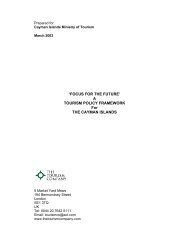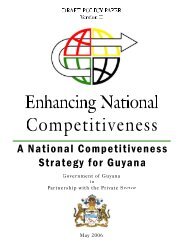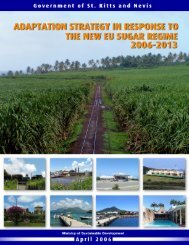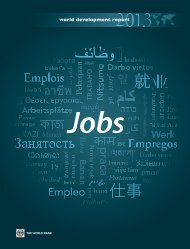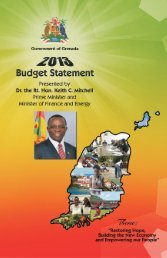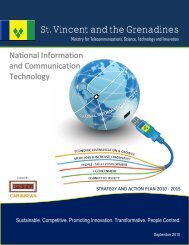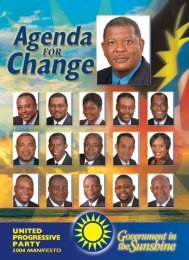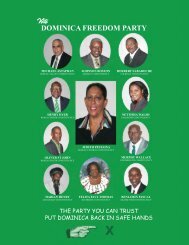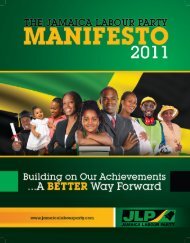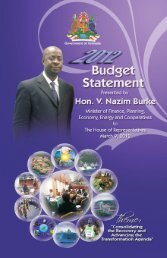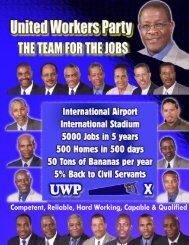Business Removing
Doing Business in 2005 -- Removing Obstacles to Growth
Doing Business in 2005 -- Removing Obstacles to Growth
- No tags were found...
Create successful ePaper yourself
Turn your PDF publications into a flip-book with our unique Google optimized e-Paper software.
28 DOING BUSINESS IN 2005<br />
BOX 4.1<br />
Who has the most rigid labor regulation—and who the least?<br />
Difficulty of hiring<br />
Least<br />
Most<br />
25, including: Romania<br />
Israel<br />
Mauritania<br />
Slovakia<br />
Central African Republic<br />
Australia<br />
Rwanda<br />
Denmark<br />
Togo<br />
Saudi Arabia<br />
Congo, Rep.<br />
Botswana<br />
Morocco<br />
Russia<br />
Chad<br />
United States<br />
Burkina Faso<br />
Namibia<br />
Niger<br />
Difficulty of firing<br />
Least<br />
Canada<br />
Costa Rica<br />
Hong Kong, China<br />
Jamaica<br />
Japan<br />
Kuwait<br />
Saudi Arabia<br />
Singapore<br />
Uganda<br />
Uruguay<br />
Most<br />
Cameroon<br />
Egypt, Arab Rep.<br />
Ukraine<br />
Congo, Rep.<br />
India<br />
Mexico<br />
Nepal<br />
Angola<br />
Tunisia<br />
Uzbekistan<br />
The Difficulty of Hiring index measures whether term<br />
contracts can be used only for temporary tasks; the maximum<br />
duration of term contracts; and the ratio of the<br />
mandated minimum wage (or apprentice wage, if available)<br />
to the average value added per working population. 14<br />
In Namibia, the 10th least regulated country, term contracts<br />
can be used for any task and have unlimited duration;<br />
the minimum wage to value added ratio is 21%. In<br />
Mauritania, the 10th most regulated country, term contracts<br />
are allowed for specific tasks and are limited to 2<br />
years; the minimum wage to value added ratio is 68%.<br />
The Difficulty of Firing index has 8 parts: whether redundancy<br />
is a fair ground for dismissal; whether the employer<br />
needs to notify the labor union or the labor ministry for firing<br />
one redundant worker; and the same for group dismissals;<br />
whether the employer needs approval from the<br />
labor union or the labor ministry for firing one redundant<br />
worker; and the same for group dismissals; whether the law<br />
mandates training or replacement prior to dismissal; if priority<br />
rules apply for dismissals; and if priority rules apply<br />
for re-employment. Uruguay doesn’t regulate any of these<br />
areas. Angola regulates all of them.<br />
Rigidity of hours<br />
Least<br />
Canada<br />
Hong Kong, China<br />
Lebanon<br />
Malaysia<br />
New Zealand<br />
Serbia and Montenegro<br />
Singapore<br />
Tunisia<br />
United States<br />
Chile<br />
Most<br />
Brazil<br />
Greece<br />
Spain<br />
Ukraine<br />
Venezuela<br />
Portugal<br />
Burkina Faso<br />
Congo, Dem. Rep.<br />
Côte d’Ivoire<br />
Niger<br />
Rigidity of employment<br />
Least Index Most Index<br />
Hong Kong, China 0 Angola 75<br />
Singapore 0 Sierra Leone 76<br />
Malaysia 3 Central African Republic 76<br />
United States 3 Rwanda 76<br />
Canada 4 Togo 76<br />
Uganda 7 Congo, Dem. Rep. 77<br />
New Zealand 7 Chad 80<br />
Slovakia 10 Congo, Rep. 86<br />
Jamaica 10 Burkina Faso 90<br />
Saudi Arabia 13 Niger 90<br />
The Rigidity of Hours index is a simple average of 5 indicators:<br />
whether night work is allowed; whether weekend work<br />
is allowed; whether the workweek consists of 5 1 ⁄2 days or<br />
more; whether the workday can extend to 12 hours or more<br />
(including overtime); and whether the annual paid vacation<br />
days are 21 or less. In Chile, the 10th least regulated<br />
country, the workday can extend to 12 hours, the workweek<br />
can extend to 6 days, there are no regulations on night and<br />
weekend work, and the minimum paid leave is 19 days a<br />
year. In Brazil, the 10th most regulated country, the workday<br />
is limited to 10 hours. Weekend work is not allowed,<br />
and the minimum paid leave is 30 days.<br />
The Rigidity of Employment index is a simple average of<br />
the Difficulty of Hiring, Rigidity of Hours and Difficulty of<br />
Firing indices, varying between 0 and 100, with higher values<br />
for more rigid regulation. Differences across countries<br />
are enormous. Saudi Arabia, with the 10th most flexible employment<br />
regulations, has no restrictive regulations on hiring<br />
and firing but regulates weekend work. Angola, with the<br />
10th most rigid regulations, regulates heavily every aspect<br />
of work hours and firing, but allows term contracts with<br />
5-year duration.<br />
Source: Doing <strong>Business</strong> database.



